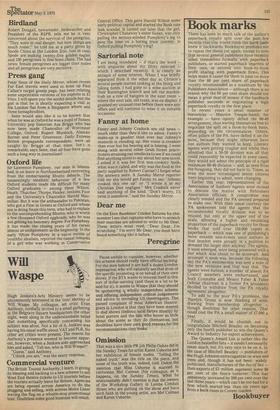Book marks
There has been so much talk of the author's paperback royalty split over the past few months that you would think the book trade knew it backwards. Bookbuyer promises not to repeat the thesis yet again, except to note that several general publishers have recently allied themselves formally with paperback publishers, or started paperback imprints of their own, or entered into book-by-book profit sharing with paperback firms. This helps make it easier for them to pass on more than the 60 per cent share of paperback royalty recommended as a maximum by the Publishers Association — although there is no reason why the 60 per cent share should not mean a great deal of money if the hardback publisher succeeds in negotiating a high paperback royalty in the first place.
In recent years a small number of mavericks — Maurice Temple-Smith, for example — have openly defied the 60-40 arrangement, thus leaving themselves free to negotiate the split on a book-by-book basis, depending on the circumstances. Others, often pillars of the PA, have defied it on the quiet, because they might otherwise have lost authors they wanted to keep. Literary agents were getting tougher and whilst they admitted that a 50-50 division was all that could reasonably be expected in some cases, they would not admit the principle of a rigid maximum 60-40 division — and, as seen from the foregoing, they did not have to. Times, as even the more intransigent senior citizens were beginning to admit, were changing.
Earlier this year, representatives of the Association of Authors' Agents were invited to discuss the matter with Publishers Association officials. A compromise was clearly .needed and the PA seemed prepared to make one. With their usual courtesy the PA spokesmen told the agents that the recommended royalty division was to be relaxed, but only at the upper end of the scale, allowing a higher and escalating proportion of the paperback royalty for those books that sold over 150,000 copies in. paperback — which was one of publishing's more notable non-events since authors in that bracket were already in a position to demand the larger slice anyway. The agents, it soon emerged, were being presented with a fait which was about to be accompli. And accompli it soon was, because the following day the PA's membership was sent a note of the new revisions and that was that. The agents were furious, a number of absent PA Council members were embarrassed, and both Constable and Messrs Faber & Faber (whose chairman is a former PA president) decided to withdraw from the PA royalty agreement altogether.
To add to the poor PA's problems, the Hamlyn Group is now thinking of withdrawing from membership altogether — though doubtless for other reasons. That could cost the PA a small matter of £7,000 a year.
Finally, it would be churlish not to congratulate Mitchell Beazley on becoming only the fourth publisher to win the Queen's Award to Industry for export achievement.
The Queen's Award List is rather like the London bestseller lists — it needn't necessarily mean much, but it's very nice to be on it. In the case of Mitchell BeazleY — publishers of the Hugh Johnson extravaganzas on wine and trees and, though it has not been widely publicised, manufacturers of the Joy of Sex— their exports of E3 million represent Some 90 per cent of the firm's turnover. This has apparently increased by 280 per cent over the last three years — which can't be too bad for a firm which started less than six years ago from a back room in Covent Garden.
Bookbuyer


































 Previous page
Previous page